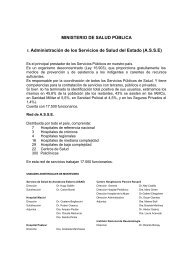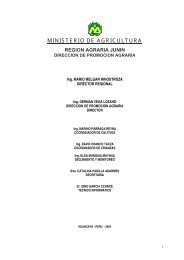- Page 1 and 2:
Copyright by Jean Laurie Love El Ha
- Page 3 and 4: Translating Nouzha Fassi Fihri's La
- Page 5 and 6: Acknowledgements I sincerely thank
- Page 7 and 8: complete, final version of "The Fig
- Page 9 and 10: Chapter Four: The Fighter..........
- Page 11 and 12: challenged and reformed in ways tha
- Page 13 and 14: night. She plans and carries out hi
- Page 15 and 16: soumis, de bien bon, de bien con" [
- Page 17 and 18: Unlike her daughters who submit to
- Page 19 and 20: Les fleurs, comme une fantaisie de
- Page 21 and 22: The shifts from past to future tens
- Page 23 and 24: it rather than through the bias of
- Page 25 and 26: Arab women, few have more precise i
- Page 27 and 28: in our audiences, the novel and the
- Page 29 and 30: Fassi Fihri was in a position to ra
- Page 31 and 32: and in these cases the translator t
- Page 33 and 34: 2002 edition of The American Herita
- Page 35 and 36: nonetheless an outsider whose persp
- Page 37 and 38: emphasizes universally recognizable
- Page 39 and 40: questions of translation approach a
- Page 41 and 42: Translators Analysis of these trans
- Page 43 and 44: To find out more about how these tr
- Page 45 and 46: sentences" and to recreate the aest
- Page 47 and 48: She further explains that "people w
- Page 49 and 50: paratextual explanations has change
- Page 51 and 52: participated intellectually in poli
- Page 53: community. Having the characters--m
- Page 57 and 58: Arrivée face à sa nièce, elle ta
- Page 59 and 60: Chapter Two: A Critical Analysis of
- Page 61 and 62: eaders' expectations, thereby augme
- Page 63 and 64: Theorists such as Edward Said and M
- Page 65 and 66: translation. However, in accordance
- Page 67 and 68: attitude toward the original author
- Page 69 and 70: the target audience and its expecta
- Page 71 and 72: literature tends to reflect the cul
- Page 73 and 74: Alternate solutions were judged and
- Page 75 and 76: Others, however, deplore the effect
- Page 77 and 78: This translation sought to challeng
- Page 79 and 80: influence. The language, cultural c
- Page 81 and 82: in with the literary traditions of
- Page 83 and 84: QUANTITATIVE VARIATION ANALYSIS Alt
- Page 85 and 86: tolerance and moderation. This pass
- Page 87 and 88: media. Consequently, most Anglophon
- Page 89 and 90: CONSTRAINTS ON NOVELISTIC PROSE The
- Page 91 and 92: family union through new blood ties
- Page 93 and 94: original journalistic tone was main
- Page 95 and 96: 14 o: Les persiennes laissaient dev
- Page 97 and 98: special occasions; when the cooking
- Page 99 and 100: variation in the treatment of trans
- Page 101 and 102: The culturally specific exclamation
- Page 103 and 104: en cadeau à sa fille pour une prem
- Page 105 and 106:
translator's perception and applica
- Page 107 and 108:
" . . . and chickens with almonds--
- Page 109 and 110:
patios, polish the tea trays, and s
- Page 111 and 112:
They were children, and they remain
- Page 113 and 114:
ut he was more so, and he had total
- Page 115 and 116:
The three old people raised their h
- Page 117 and 118:
Mina, his younger sister, intervene
- Page 119 and 120:
He was already there, sitting on th
- Page 121 and 122:
She ran away from home one morning,
- Page 123 and 124:
"Let's not get upset," he intervene
- Page 125 and 126:
Sometimes her mother came to visit,
- Page 127 and 128:
sharif, in spite of his material po
- Page 129 and 130:
"I was on a business trip in Madrid
- Page 131 and 132:
ambergris, your smile sweet as a su
- Page 133 and 134:
eliefs, and trampled our traditions
- Page 135 and 136:
eturn. Most of them only knew of hi
- Page 137 and 138:
In the side alleyways, one could se
- Page 139 and 140:
lack ears," as they called the Sene
- Page 141 and 142:
"What's new?" Sharif asked the arti
- Page 143 and 144:
him with a pumice stone, anoint him
- Page 145 and 146:
Kenza had inherited her father's ga
- Page 147 and 148:
Oh, rosy cheeks, red rose of Sidjil
- Page 149 and 150:
Kenza contemplated her girls for wh
- Page 151 and 152:
The family gathered around a cousco
- Page 153 and 154:
"We'll force them!" "We are a free
- Page 155 and 156:
future. But can you prevent the you
- Page 157 and 158:
Tayeb, was under house arrest and f
- Page 159 and 160:
mules loaded with produce were turn
- Page 161 and 162:
one another on makeshift platforms,
- Page 163 and 164:
these young men as solid as rock. I
- Page 165 and 166:
nonexistence? The suicide of dreams
- Page 167 and 168:
He began to decipher the sky for he
- Page 169 and 170:
violence. They were peaceable citiz
- Page 171 and 172:
temper. The neighbor men and women
- Page 173 and 174:
Carrying his slippers--he wanted to
- Page 175 and 176:
Great," which Sharif took as a welc
- Page 177 and 178:
obstinate character. She is stubbor
- Page 179 and 180:
Who was this hero who came so late
- Page 181 and 182:
humanity. It is the third monotheis
- Page 183 and 184:
egular army. We simply meant to sho
- Page 185 and 186:
drowned in the gurgle of the wall f
- Page 187 and 188:
man had come. They went down slopin
- Page 189 and 190:
Walking around the exposed bodies,
- Page 191 and 192:
"'France was no longer the invincib
- Page 193 and 194:
Finally, they saw a faint light and
- Page 195 and 196:
looking like scarecrows set up to k
- Page 197 and 198:
with suddenly dies, you get caught
- Page 199 and 200:
"Now he is dead, and I still have t
- Page 201 and 202:
athes and warms new chicks. So I be
- Page 203 and 204:
You have left me like one who cooks
- Page 205 and 206:
the men who stood there looking at
- Page 207 and 208:
Another used a ladle to fill bucket
- Page 209 and 210:
"exclude them from their own cultur
- Page 211 and 212:
They were still forced to help him,
- Page 213 and 214:
they neglected their old father. He
- Page 215 and 216:
wondering eyes of a dada who was ba
- Page 217 and 218:
Their love was not guilty. They lov
- Page 219 and 220:
acelets of the leader.' I even had
- Page 221 and 222:
"I want her to be free like the ant
- Page 223 and 224:
adolescents. Lalla Kenza's father h
- Page 225 and 226:
Never had anyone seen a vicarious p
- Page 227 and 228:
The two women went forward, one wit
- Page 229 and 230:
When questioned, the woman who was
- Page 231 and 232:
Then he reached out and grabbed the
- Page 233 and 234:
Her dada held a silver platter with
- Page 235 and 236:
to rest his head on his beloved's c
- Page 237 and 238:
"He who claims to be strong dies of
- Page 239 and 240:
slave who still has tree bark stuck
- Page 241 and 242:
"It has not satisfied my thirst!" "
- Page 243 and 244:
people, so vulnerable and ancient,
- Page 245 and 246:
"Don't worry about it. I had my sha
- Page 247 and 248:
conjures images, brings them alive
- Page 249 and 250:
The young men arrived exhausted and
- Page 251 and 252:
calculations. However, the revenue
- Page 253 and 254:
Everything went as she had wished.
- Page 255 and 256:
ut beneath her nobly arched forehea
- Page 257 and 258:
Kenza left the world and its confli
- Page 259 and 260:
Fassi Native of Fez. Filali A famil
- Page 261 and 262:
Traditions of the Prophet Refers to
- Page 263 and 264:
Oui, l'histoire de Le Ressac, l'his
- Page 265 and 266:
littérature et de la poésie en pa
- Page 267 and 268:
the household. She is a second moth
- Page 269 and 270:
Appendix B: Marjolijn de Jager's e-
- Page 271 and 272:
that right. I wanted it to be a kin
- Page 273 and 274:
Appendix D: Catherine Cobham's e-ma
- Page 275 and 276:
Appendix E: Marilyn Booth's e-mail
- Page 277 and 278:
the most important aspect or result
- Page 279 and 280:
References Abouzeid, Leila. Year of
- Page 281 and 282:
Johnson-Davies, Denys. E-mail to th
- Page 283 and 284:
Walker, Alice. The Color Purple. Sa
















